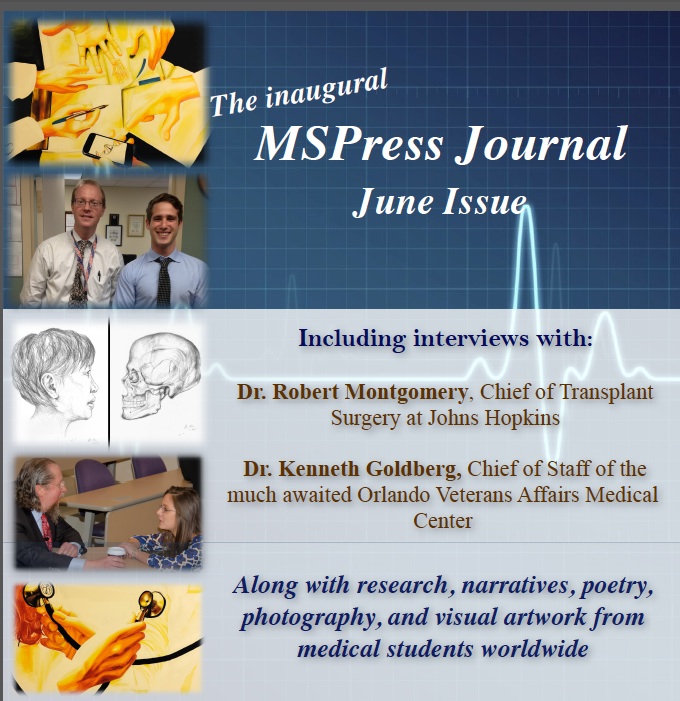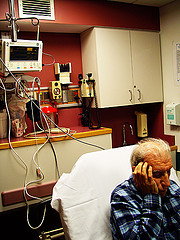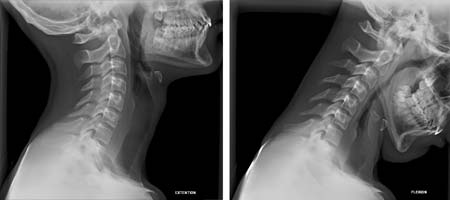The MSPress Blog will be taking a summer break to work on the upcoming journal.
Look for more from the MSPress Blog in July!

The MSPress Blog will be taking a summer break to work on the upcoming journal.
Look for more from the MSPress Blog in July!


I am a medical student because I love questions. After a blood vessel takes a punch, what causes the platelet pile-up? What makes people blink, gag, cough, or sneeze? Why is cat litter as scary as alcohol for a pregnant woman?
Some medical questions are unanswered. Yet, science promises progress. With enough grant-funded work in labs and clinics, scientists can describe new diseases. Medicine will show where illness happens, researchers will explain how it happens, and epidemiologists will predict who it is more likely to happen to and when it could happen to them. Even with all of this knowledge, there is one question I do not expect my medical training to answer.
While I go to lectures, practice interview skills, and learn how to diagnose and prescribe, people endure pain, distress, and loss, and I can’t explain why. Why do people suffer?

I can look to people who suffer for answers. It is not hard to find written first-person narratives of suffering. In these narratives, protagonists are often cast in two roles: the suffering fighter and the wise sufferer.
As Kathlyn Conway discusses in her essay, “The Cultural Story of Triumph”, the narrative of a “suffering” fighter dominates over other stories of illness. Illness becomes a journey to physical cure. Where physical cure is not possible, illness is cast as a path to wisdom, a form of moral development. The patient becomes a traveler who should somehow be “uncomplaining, strong, and brave” on this journey (Conway, 2007).
“Illness is a chance to show us your guns and triumph!” the medical culture seems to say.
If society expects sick people to be “fighters” what else do we expect from them? I think of S, a 62-year old woman with osteosarcoma, who put on lipstick while her skin was sinking deeper into the spaces between her bones. “Can’t let this cancer make me ugly honey,” she said as she applied her makeup in the mirror. What does it mean that S’s fight against cancer involved cosmetic routines?
The idea that people grow in strength or wisdom while suffering is familiar to me. As essayist, Pico Iyer describes in “The Value of Suffering”, suffering can be a doorway to compassion, loss can be an invitation to appreciate nuance. Yet, my intestines tangle when I imagine telling a patient who suffers, “What an opportunity to unfurl in wisdom!” Even if I did not say this out loud, I wonder what my expectations might communicate.
 Last year, my close friend J died of metastatic breast cancer while 27 weeks pregnant with a boy. During her first trimester, we would lie on my floor and look up at the ceiling when retching woke her in the morning. Over the next few months we went to her prenatal visits and giggled over possible baby names. Then, she stopped eating and her nails turned yellow. Her doctor said, “Hopefully it’s hepatitis.” He didn’t bother to tell us what it hopefully wasn’t. Her yellow vomit and “liver nodules” explained. She was 24 years old when she passed away and left behind her husband and 3-year old son.
Last year, my close friend J died of metastatic breast cancer while 27 weeks pregnant with a boy. During her first trimester, we would lie on my floor and look up at the ceiling when retching woke her in the morning. Over the next few months we went to her prenatal visits and giggled over possible baby names. Then, she stopped eating and her nails turned yellow. Her doctor said, “Hopefully it’s hepatitis.” He didn’t bother to tell us what it hopefully wasn’t. Her yellow vomit and “liver nodules” explained. She was 24 years old when she passed away and left behind her husband and 3-year old son.
That was an inexplicable catastrophe. But J’s husband needed to believe that somehow God had planned this. If he believed that her death was one example of many forces that roll over us the way tires would ants trying to cross a highway, then how could he continue with day-to-day life? How would he keep being his son’s Papa?
Even after I gather years of experience with suffering, I do not expect to be able to explain it. I do know that the stories we tell about suffering can influence how we relate to patients.
My expectations form the questions I ask and the things I attend to. Imagine me telling a patient, “Fight your cancer, but stay pretty. Also, grow spiritually so you can teach me through your suffering.” That feels like a lot of pressure to put on someone who is ill, even if it is unspoken. If I look for a suffering fighter in a patient who cannot cast herself in that role, I risk disrespecting her experience. If I try to learn wisdom from a patient who does not see his illness as a journey to moral development, I might disregard his life story.
Medical school teaches me to synthesize and simplify information. The more narratives I hear, the more I feel a desire to string them together along a unifying theme. Cultivating attention to less common stories about suffering and loss reminds me to listen when I long to explain.
Sources:
Conway, Kathlyn. 2007. Beyond Words: Illness and the Limits of Expression. University of New Mexico Press. Albuquerque
Iyer, Pico. 2013. The Value of Suffering. New York Times.
Featured image:
“After a Night Shift” by Stephanie Scott


The day’s clinical case presented in anatomy lab was that of a 40-year-old male who had dislocated his sixth cervical vertebrae in a surfing accident. Upon arrival at the hospital, he had suffered full paralysis from the neck down but was still conscious and alert. He and his wife were told that surgery would be needed to repair his broken neck, but that the chances were very slim that he would ever regain the functions he had lost due to the injury. The last page of the case was an X-ray image of the man’s vertebrae fused with screws and plates realigning his spinal cord. His prognosis was left to the students’ speculation. We returned to the classroom to debrief the case.
As a group, we discussed the grim injury in all of its anatomic and physiologic glory. Guest surgeons explained the gravity of the man’s situation and the devastating symptoms with which he presented. The case ended as they all do: we hoped for the best for our fictional patient but understood the assumed permanence of an injury of this type.
There was a long pause before Dr. Payer said, “Would you like to meet him?”
Shocked, we all turned to the back of the room where Dr. Topping was opening the door for our patient – would he be in an electric wheelchair? Would his body appear atrophied and weak from years of paralysis? How would he get down the steps in our classroom?
A strong, unfamiliar voice echoed from the front of the classroom. “Hi, everyone.”
We turned around to see who could be distracting us from seeing our patient come through the door. It did not take long for us to all realize that the man standing before us on two perfectly healthy legs, holding a microphone with two fully-functioning hands, with zero sign of ever having suffered a devastating cervical subluxation, was our patient. All 120 of us gasped in unison. It was an incredible sight, an absolute medical miracle. When you spend your days studying everything that goes wrong with the human body, it is amazing to see something that went right−the experience had me in tears.
He filled in all the gaps of the case and explained the details of his injury and his recovery. He talked about his physicians and surgeons and how he had ran the Turkey Trot just two months after his accident. Then, his best friend who happened to be a physician at the hospital to which he was flown told us the most important factor in his return to normalcy: when everyone else had lost hope, he never did. He refused to accept a prognosis of permanent paralysis. He refused to accept the possibility of an unsuccessful surgery. He never gave up on his body, so his body never gave up on him.

This story is, of course, rare. And yet, it speaks volumes about the power of the human spirit. As a medical student, I will be one of the last people to refuse credit to the nurses, physicians, paramedics, and surgeons who undeniably saved this man’s sense of a normal life. But I also know firsthand what happens when you give up. Keeping hope does not mean you automatically win the battle. But the alternative guarantees a loss.
It is a concept that I have been battling with since I began medical school. As a pre-medical undergraduate student, I had nothing but the utmost confidence in myself. I saw myself receiving my white coat. I saw myself as a doctor. Of course, I had my doubts – especially around application season. But even on my darkest days, I knew I could get to medical school. I made it, and in the process, have lost all confidence in myself. I feel as though I am the only one who does not believe in my ability to succeed. I feel like a fake, an imposter; as though I’m floating through a movie scene just waiting for someone to yell “CUT!” Perhaps it is because the next step is actually being a doctor. The next step no longer involves passing a module exam and meeting research deadlines. The next step involves real people, real families, real life, and real death.
And yet, I could not feel more at home. There is really no place else I would rather be. But I still fall asleep every night to a lullaby of forced distraction as my mind tries to convince me that I cannot do it, that I will not make it through, and that everyone else has such a better handle on life than do I. And once you lose hope, no amount of distraction can help you fall asleep. Give up on your mind, and it will give up on you.
Featured image courtesy of Mark H. Anbinder